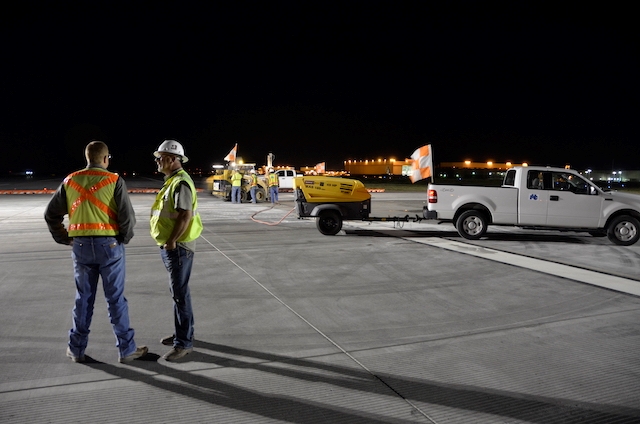
The College of Engineering partnered with Garver, an engineering and architectural services firm, over the last year to help write a guidebook for construction companies working on security improvements at U.S. airports. Garver undertook the project after being awarded a research grant by the National Safe Skies Alliance, a nonprofit funded by the Federal Aviation Administration.
After Garver received the grant, Garver aviation planning leader Nathan Polsgrove contacted Richard Ham, associate director for the College of Engineering's Master of Science programs in Operations Management and Engineering Management, who also designed the college's Homeland Security Graduate Certificate.
Polsgrove stated, "Garver is a great supporter of the university and we believe partnerships in this type of applied research are key to providing a final product that can help improve security. Richard was recommended to us by nationally recognized homeland security experts. Working with him and the university was a great experience and vastly improved our final deliverables."
 Richard Ham |
The project also provided graduate students helping on the project with exposure to homeland security topics, Ham said.
"This type of experience is key to the future of homeland security and adding to the body of knowledge in this area," he said. "Active and alert operations managers armed with knowledge will be key to mitigating future attacks in all modes of transportation."
For more information on the Homeland Security Graduate Certificate and opportunities it can provide, please review the requirements here.
The National Safe Skies Alliance is the leading applied research program funded by industry in the United States to improve aviation security and infrastructure. Many past projects have been key to shaping aviation security legislation, regulatory guidance and policy.
About the College of Engineering: The University of Arkansas College of Engineering is the largest engineering program in the state of Arkansas. Over the past decade, the college has experienced unprecedented growth. Undergraduate enrollment has doubled since 2007, and total enrollment in the college is now over 4,000 students. The College of Engineering offers graduate and undergraduate degrees in nine engineering fields, as well as incorporating distance learning and interdisciplinary programs. Faculty in the college conduct research in many key areas, including electronics, energy, healthcare logistics, nanotechnology, transportation and logistics.
 About Garver: Founded in 1919, Garver is an employee-owned multi-disciplined engineering, planning, architectural, and environmental services firm with nearly 900 employees across the United States. Offering a wide range of services focused on aviation, construction, facilities design, federal, survey, transportation, water, and wastewater, Garver sits in the top 125 of the Engineering News-Record's prestigious Top 500 Design Firms list and is consistently recognized as a best firm to work for.
About Garver: Founded in 1919, Garver is an employee-owned multi-disciplined engineering, planning, architectural, and environmental services firm with nearly 900 employees across the United States. Offering a wide range of services focused on aviation, construction, facilities design, federal, survey, transportation, water, and wastewater, Garver sits in the top 125 of the Engineering News-Record's prestigious Top 500 Design Firms list and is consistently recognized as a best firm to work for.
Contacts
Rich Ham, associate director
College of Engineering
479-575-5521,
Jennifer P. Cook, director of communications
College of Engineering
479-575-5697,